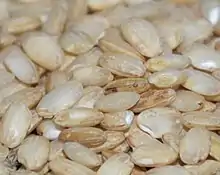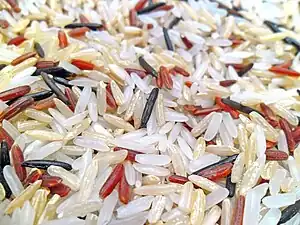Vialone Nano
Vialone Nano is an Italian semifino (medium-grain) rice variety. It is typical of the flat, rice-growing areas of the southern Provincia di Verona (Bassa Veronese, "Veronese lowlands"), in Veneto.
Vialone Nano is a cultivar of the Japonica group of varieties of Oryza sativa.

Culinary uses
Similar to the Carnaroli, Vialone Nano is an appreciated risotto rice. While rich in starch (therefore making for creamy risottos), its high amylose content allows it to maintain its shape and absorb much liquid during cooking.
Riso Nano Vialone Veronese IGP
Vialone Nano rice has been grown in Italy since 1937.[1] It was developed by crossing Vialone rice with a variety called Nano because of the plant's low height.[2]
In 1996 Veronese Vialone Nano rice was given the Protected geographical indication (Italian: IGP), under the name of Riso Nano Vialone Veronese IGP.[3]
The processed grain should be of medium size, round in shape and semi-long with pronounced tooth and rounded section. It should appear white in color and display an extended pearlescent core.[4]
Area of production
Cultivation and processing of Nano Vialone Veronese IGP is conducted exclusively in the territory of the following 24 municipalities, all within the Provincia di Verona:[4]
See also
References
- Lorella Fabris (1 August 2014). "Tipi di riso, varietà e usi". Agrodolce.it (in Italian). Retrieved 4 July 2017.
- "Il riso del nostro territorio" [The rice of our territory]. Stoppato1887.com (in Italian). Retrieved 4 July 2017.
- "Consorzio di Tutela della I.G.P. Riso Nano Vialone Veronese". Consorzio di Tutela della I.G.P. Riso Nano Vialone Veronese.
- "Disciplinare di produzione e lavorazione del Riso Nano Vialone Veronese" [Procedural guidelines for the production and processing of Riso Nano Vialone Veronese], Gazzetta Ufficiale della Repubblica Italiana, Serie Generale (in Italian) (225), p. 18, All. 1, art. 1, 2010-09-25, retrieved 13 July 2014
